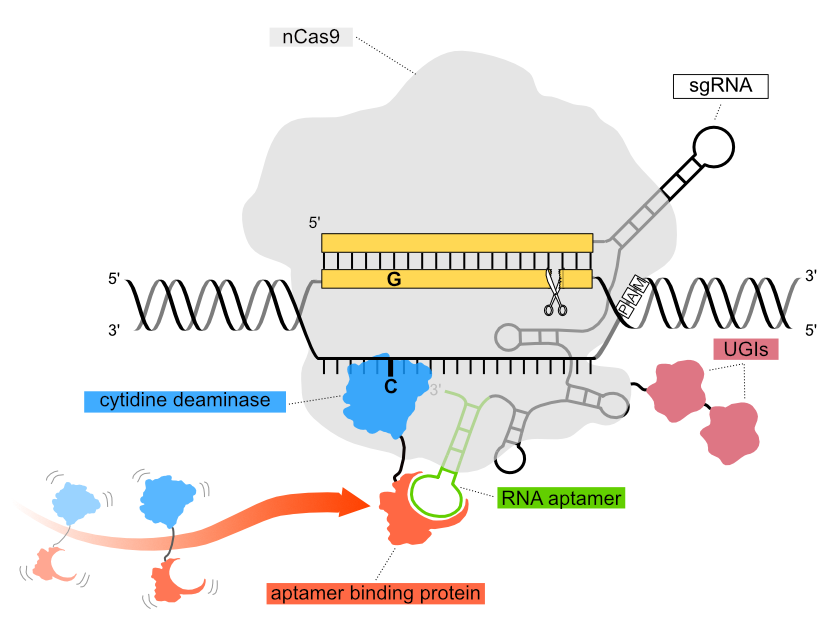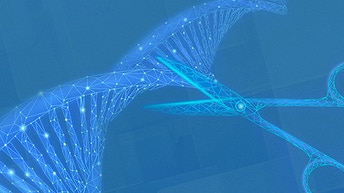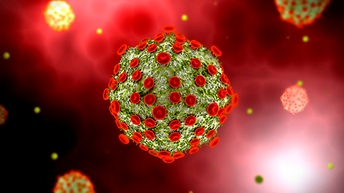
A unique, powerful approach for safer and more effective complex genetic engineering
The Pin-point™ base editing technology offers a uniquely powerful approach to safer and more effective complex and multiplex gene editing for the development of cell and gene therapies.
Would you like the opportunity to use base editing in the development of next generation cell and gene therapies? The Pin-point base editing system provides the specificity and predictability of base editing combined with the safety benefits of avoiding introducing double strand DNA breaks as an alternative to traditional CRISPR editing.
Modular base editing platform: A CRISPR alternative
With the Pin-point platform, there is potential for multiplex gene editing capabilities, as well as for combining multiplex knockout and knock-in edits in a single intervention, making it an attractive technology for both cell and gene therapies.
The platform is modular so that it can be optimized for different applications. You can screen through nuclease, deaminase, and gRNA combinations to determine the configuration that achieves the desired editing outcome – or work with our in-house team who can do this for you.
To provide broad access to base editing across the research and therapeutic market, we offer Pin-point base editing reagents and services, as well as licensing to the underlying patents and patent applications.

In one possible configuration of the Pin-point platform, a catalytically modified nickase Cas9 (nCas9) is directed to the target site by a single guide RNA (sgRNA) that includes an extended RNA aptamer scaffold. The RNA aptamer recruits the deaminase (here shown as a cytidine deaminase) via the aptamer binding protein domain.
Key benefits of the Pin-point platform
- Predictable, precise, and efficient single and multi-gene editing
Base editing efficiently converts target bases, as opposed to generating complex insertions or deletions. This means the cell populations have more homogeneous, predictable, and precise single base change outcomes compared to traditional CRISPR-Cas9. Single base changes can still introduce stop codons or splice site disruptions that can result in protein knockouts. - Simultaneous knock-in and knockout in a single intervention
The Pin-point platform uniquely allows for site-specific targeted knock-in of donor template sequences. Read more about it here: https://www.cell.com/molecular-therapy-family/molecular-therapy/fulltext/S1525-0016(24)00423-4. - Modular control over editing window to help reach targets of interest
Different configurations of the platform have been shown to achieve precise editing of target bases within the base editing window, avoiding unwanted bystander editing effects. Easily screen through nuclease, deaminase, and gRNA combinations to identify the configuration that achieves the desired editing outcome by leveraging our in-house resources or within your own pipeline. - Improved safety profile compared to standard CRISPR-Cas9
The Pin-point platform has been demonstrated to result in reduced cytotoxicity, fewer off-targets, and lower risk of genomic aberrations compared to other gene editing methods. - Proven high editing efficiencies in T Cells, iPSCs, and HSPCs
We provide protocol guidelines for precise and efficient multiplex and single-plex editing in clinically relevant cell types. - Nuclease and deaminase flexibility to optimize the system for your application
Our universal platform is compatible with Type II and Type V nucleases as well as a variety of deaminase variants [Scientific poster: Development of the Pin-point platform: a versatile base editing technology with broad Cas enzyme and deaminase compatibility well suited for Cell and Gene Therapy, Perez-Duran et al, 2024]. This allows for clinical adoption of base editing with the nuclease and deaminase best suited to your unique needs.
By democratizing access to base editing, the Pin-point platform can help you to accelerate the development of novel treatments and potential cures for genetic disorders.
Please contact us if you are interested in integrating base editing into your therapeutic pipeline for cell or gene therapy programs and one of our dedicated corporate development partners will be in touch.
Pin-point™ base editing reagents are available for research use only and are not for diagnostic use or direct administration into humans or animals. The Pin-point™ base editing platform technology is available for clinical or diagnostic study and commercialization under a commercial license from Revvity.
Featured resources
You may also be interested in

How can we help you?
We are here to answer your questions.































